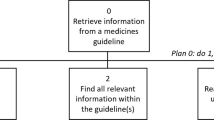Abstract
Introduction
National reporting programmes usually collect and analyse medication error reports from healthcare providers in their own country and only disseminate guidance to healthcare providers within the borders of their country. It is unclear how much different national programmes could learn from each other. The aim of this study was therefore to explore to what extent alerts and newsletters about medication errors issued in other countries could also be relevant for the Netherlands.
Methods
Ninety disseminated information items that had been issued by three national programmes (Canada, the US and the UK) in the period from June 2009 until June 2012 were collected. These items were compared with the national reporting programme Central Medication Incidents Registration (CMR-NL) in The Netherlands. Each selected item was subsequently assessed independently with six assessment criteria: is the medicine available in the Netherlands? If so, could a similar error occur in the Netherlands? Did the CMR-NL reporting programme receive any reports about a comparable (or even identical) error? If so, did these reports include any errors with serious temporary or permanent harm? Did the CMR-NL disseminate output about it?; If so, what was the dissemination date of CMR-NL?
Results
From the 90 items, 87.8 % (n = 79) were relevant for Dutch healthcare. For 43 of the 90 items (47.8 %), the CMR-NL had received comparable (or even identical) errors but had not disseminated any alert or newsletter about these errors. The CMR-NL had disseminated an alert or newsletter for 14 of the 90 items (15.6 %).
Conclusion
This study showed for a broad range of errors that the Dutch national reporting programme could learn from the three reporting programmes in Canada, the US and the UK. National reporting programmes can benefit from sharing alerts and newsletters that enhance the learning between countries.

Similar content being viewed by others
References
Leotsakos A, Caisley L, Karga M, Kelly E, O’Leary D, Timmons K. High 5s: addressing excellence in patient safety. World Hosp Health Serv. 2009;45(2):19–22.
Sparkes D, Rylah B. The World Health Organization Surgical Safety Checklist. Br J Hosp Med (Lond). 2010;71(5):276–80.
Corrigan JM, Donaldson MS, Kohn LT, Institute of Medicine, Committee on Quality of Health Care in America. To err is human building a safer health system. Washington, DC: National Academy Press; 2000.
Cheung KC, van den Bemt PM, Bouvy ML, Wensing M, De Smet PA. A nationwide medication incidents reporting system in The Netherlands. J Am Med Inform Assoc. 2011;18(6):799–804.
Cousins DH, Gerrett D, Warner B. A review of medication incidents reported to the National Reporting and Learning System in England and Wales over 6 years (2005–2010). Br J Clin Pharmacol. 2012;74(4):597–604.
Magrabi F, Ong MS, Runciman W, Coiera E. An analysis of computer-related patient safety incidents to inform the development of a classification. J Am Med Inform Assoc. 2010;17(6):663–70.
Holmstrom AR, Airaksinen M, Weiss M, Wuliji T, Chan XH, Laaksonen R. National and local medication error reporting systems: a survey of practices in 16 countries. J Patient Saf. 2012;8(4):165–76.
Cheng L, Sun N, Li Y, Zhang Z, Wang L, Zhou J, et al. International comparative analyses of incidents reporting systems for healthcare risk management. J Evid Based Med. 2011;4(1):32–47.
International Medication Safety Network. 2013. [Ref Type: Internet Communication].
Cheung KC, van RA, Cousins D, De SP. Improving European cooperation on medication errors. Lancet 2014; 383(9924):1209–1210.
Institute for Safe Medication Practice Spain. Alert about an error drug preparation cabazitaxel. Ref Type: Internet Communication].
Stichting Portaal voor Patiëntveiligheid/CMR. CMR alert Fout in VTGM-voorschrift leidt tot te hoge dosering cabazitaxel (Jevtana®) [CMR alert Error in drug preparation specification leads to excessively high dose of cabazitaxel (Jevtana®)]. 2013. [Ref Type: Internet Communication].
European Medicine Agency. Medication error-Follow-up Actions from workshop: Implementation Plan 2014–2015. European Medicine Agency, editor. London. [Ref Type: Report].
Benn J, Koutantji M, Wallace L, Spurgeon P, Rejman M, Healey A, et al. Feedback from incident reporting: information and action to improve patient safety. Qual Saf Health Care. 2009;18(1):11–21.
Acknowledgments
The authors would like to thank Arianne van Rhijn for exploring the items and the reported medication errors for this research. Arianne van Rhijn is a pharmacist and works for the Central Medication incidents Registration (CMR) organisation in The Netherlands. Thanks also go to Michael Cohen from the US Institute for Safe Medication Practices (IMSP-US), Dr. David Cousins from National Health System England, and David U from Institute for Safe Medication Practices in Canada (ISMP-Canada) for the design of this study and sending the items. Also, thanks to Amanda Wollitz and Michael O’Connor from the US Institute for Safe Medication Practices (IMSP-US) for filling in the questionnaire.
Authors contributions
For this manuscript, all authors have substantially contributed to the conception and design, or analysis and interpretation of data, drafting the article or revising it critically for important intellectual content and final approval of the version to be published.
Conflict of interests
Ka-Chun Cheung, Patricia MLA van den Bemt, Marcel L Bouvy, Michel Wensing and Peter AGM De Smet received no support from any organisation for the submitted work; have no financial relationships with any organisations that might have an interest in the submitted work in the previous 3 years, and have no other relationships that could appear to have influenced the submitted work.
Funding
None and no financial relationships with any organisations that might have an interest in the submitted work in the previous three years.
Ethics committee approval
Not applicable.
Data sharing statement
All data of this study is available on request by the corresponding author.
Author information
Authors and Affiliations
Corresponding author
Electronic supplementary material
Below is the link to the electronic supplementary material.
Rights and permissions
About this article
Cite this article
Cheung, KC., van den Bemt, P.M.L.A., Bouvy, M.L. et al. Relevance of Foreign Alerts and Newsletters for the Medication Errors Reporting Programme in The Netherlands: An Explorative Retrospective Study. Drug Saf 37, 981–987 (2014). https://doi.org/10.1007/s40264-014-0229-9
Published:
Issue Date:
DOI: https://doi.org/10.1007/s40264-014-0229-9




